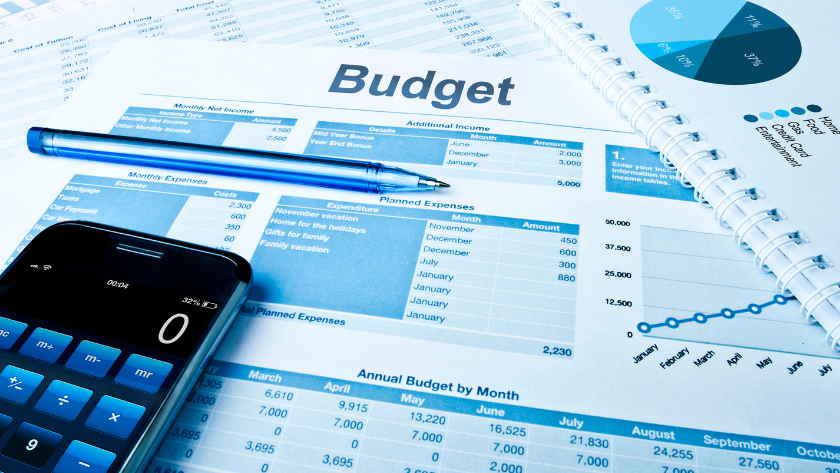Living frugally does not mean depriving yourself of the things you enjoy; it means being smarter about how you manage your money. It’s about making mindful spending choices, prioritizing your needs over wants, and focusing on long-term financial security rather than immediate satisfaction. It also involves cultivating a mindset of resourcefulness and appreciating the value of money, enabling you to enjoy life while spending less. The goal is not to deprive yourself, but to create a lifestyle that allows you to live comfortably within your means.
Create a Budget
The first step in any journey to frugal living is creating a budget. A budget is more than a list of your income and expenses; it’s a tool that lets you see exactly where your money is going and helps you make informed decisions about your finances. It helps you recognize areas where you can cut back and save money. Be detailed and specific, write down all your income sources, and all your expenses. From rent or mortgage payments to that daily cup of coffee, every penny counts. This way, you can clearly see what is left over and where you may be overspending.
Eliminate or Reduce Non-Essential Expenses
Now that you have a clear picture of your spending habits, take a close look. Are there any non-essential items you can cut out? This could be an unused gym membership, a monthly subscription you rarely use, or dining out too often. Try to identify things you can live without and remove them from your spending. This step alone can help you save a substantial amount of money.
Shop Smart
Smart shopping is a key aspect of frugal living. Seek out sales, use coupons, and consider bulk purchases to save money. Additionally, think about purchasing used items or swapping with friends or family. Not every item needs to be brand new, especially when it comes to children’s clothing, which they often outgrow before wearing out. Used items can be just as good as new ones but usually come with a much lower price tag. Remember, the aim is to get the best value for your money.
DIY
Whenever possible, consider the do-it-yourself approach. This could range from home repairs to crafting homemade gifts. There are YouTube DIY tutorials covering nearly every topic. Not only can this approach save you money, but it can also serve as an enjoyable and fulfilling hobby. By acquiring new skills, you’re simultaneously investing in yourself and saving money.
Invest and Save
Don’t just earn money, make it work for you by investing. One option to consider is a retirement account, ensuring a secure future when you retire. Another suggestion is to establish an emergency fund, which can serve as a safety net for unforeseen expenses, providing peace of mind. Even if you can only set aside a small amount each month, don’t be deterred. Small, consistent contributions can accumulate significantly over time. Remember, the key to successful saving and investing is consistency, not the amount. Your most valuable asset is time. The more time you allow for your investments to grow, the more you can take advantage of compound interest, resulting in larger savings in the long run.
Avoid Debt
Try to pay off your debts as soon as possible. The longer you carry debt, the more interest you’ll pay. If you find yourself in a cycle of debt, try to break free by prioritizing paying off your debts.
There are various approaches to paying off debt. We suggest the snowball approach, which builds confidence quickly and encourages long-term commitment. However, if you prefer a different strategy, choose the one that suits you best. Every little contribution counts.
Plan Your Meals
Planning your meals in advance can help you save a lot of money. It reduces the impulse to eat out or order takeaways and helps you make the most of the groceries you buy, reducing waste. Try to plan meals around what is on sale or in season to save even more. Remember, cooking at home is usually more affordable and healthier than eating out.
Buy Generic Brands
Often, generic brands are just as good as their name-brand counterparts but come at a fraction of the cost. Don’t be fooled by fancy packaging. Check the ingredients or materials, and you may find that generic brands offer the same quality at a lower price.
Take Advantage of Free Entertainment
Look for free events in your city, visit the public library, go for a hike, or organize a game night with friends. There are plenty of ways to have fun without spending a lot of money. Creativity can often replace spending when it comes to entertainment.
Educate Yourself About Personal Finance
The more you know about personal finance, the better equipped you’ll be to make smart decisions with your money. There are plenty of free resources available online and at your local library. Spend some time educating yourself about budgeting, investing, and saving. Knowledge is power, especially when it comes to your finances.
Frugal living is not about sacrifice or deprivation; it’s about choosing to spend your money in ways that bring long-term benefits, rather than instant gratification. It’s about making informed decisions that align with your financial goals and values. And remember, frugality is not a one-size-fits-all approach. What works for one person may not work for another. So, experiment with different strategies until you find what works best for you.





